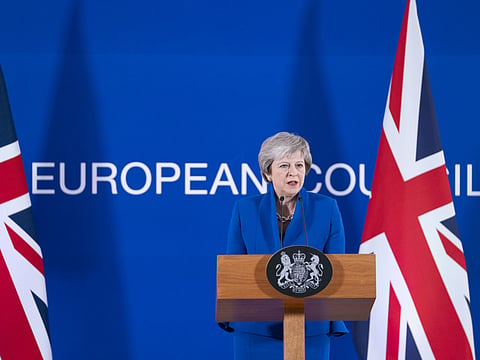Britain finally has its Brexit treaty
UK PM Theresa May faces a difficult task in selling the deal to a divided parliament

The European Union and United Kingdom have signed off on agreements that set out the terms and conditions for Brexit and establish a future framework for the relations between them moving forward after March 29, 2019. Indeed, as with most agreements that are agreed to, on such a difficult issue as Brexit and with so many competing parties and interests at play, not all sides can be fully pleased with the final document, but such is the nature of negotiations and the art of compromise.
At Sunday’s special summit of European leaders in Brussels there was a sense of sadness and of loss, that indeed the UK was ending its 45-year relationship with the EU. It was a meeting tinged with regret over the decision by the British to walk away from the ideals of a Europe bound by common goals, a strong economy that is the third largest in the world, and the free movement of people, goods, trade and services across the political, social and economic bloc.
But Europe’s leaders have also made it clear that the Brexit documents agreed to and signed off on Sunday is the only Brexit deal on the table for the UK. After 18 months of talks set against a backdrop of infighting and disunity in the ranks of Theresa May’s Conservative party and a minority government beholden to 10 MPs from Northern Ireland with a single point of view, this Brexit deal is now sealed and signed off — and will not be reopened by the EU.
Clearly, the message to the UK prime minister is that Brussels wants this Brexit matter closed. But in the UK, however, the real Brexit decision must be made. May faces a difficult task to get this agreement approved by a majority in the House of Commons.
Her cabinet is divided, so too her Conservative party — and so too the main opposition Labour party, with the Scottish Nationalist Party and the Liberal Democrats also opposed.
For May, the stakes could not be higher, and she is already facing down an insurrection in her party over her leadership. Should May lose the Commons vote on the Brexit deal, that insurrection will gain new impetus.
Certainly, it seems as if the UK stands on the brink of a precipice, one where the Commons is unable to find a way forward. Should indeed that happen, then the sensible measure would be to put the agreement reached between the EU and UK to a referendum — a take it or leave it choice on a topic of such national and economic significance. It was, after all, a referendum that caused this conundrum in the first instance.



